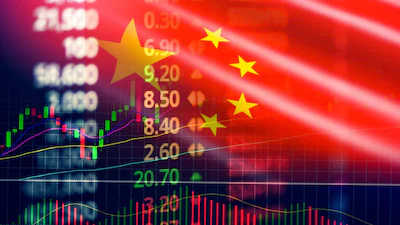07-Apr-2025, 02:08 PM In a shocking turn of events, China shares plunged dramatically, marking what could be the worst one-day meltdown since the 2008 global financial crisis. Investors were left stunned as stock indices nosedived amid growing concerns over China’s slowing economy, escalating property sector turmoil, and increasing regulatory uncertainty. This financial downturn has rattled not just domestic markets but also global investors who have long considered China a vital engine for world economic growth. As the trading session progressed, fears escalated, and billions were wiped off the market in hours.
What Triggered the Collapse in China Shares
The sudden fall in China shares has been attributed to multiple converging factors. Chief among them is the ongoing crisis in China’s property sector, highlighted by the downfall of major real estate firms like Evergrande and Country Garden. These companies have struggled to repay debts, triggering a loss of confidence among institutional investors.
Another significant contributor has been the lack of strong economic recovery post-COVID-19. Despite lifting pandemic-era restrictions, the Chinese economy has not bounced back as expected. Consumer demand remains subdued, exports have slumped, and youth unemployment is at record highs.
Moreover, recent government crackdowns on sectors such as tech, education, and gaming have amplified fears of overregulation. Foreign investors, already wary of China’s opaque financial system, are now pulling out in droves, exacerbating the plunge in China shares.
Comparisons to the 2008 Global Financial Crisis
Analysts have drawn comparisons between today’s market conditions and the 2008 financial crisis, during which China shares experienced a steep decline. The Shanghai Composite Index dropped by nearly 7% in a single session, echoing the kind of volatility last seen during the Lehman Brothers collapse.
Financial experts warn that while today’s crash may not be triggered by the same causes as in 2008, the implications could be equally severe if corrective measures are not taken swiftly. The psychological impact of such a drastic fall could have long-term consequences for investor sentiment in China.
Global Ripple Effects of Ch Market Meltdown
The steep decline in shares has sent shockwaves through global markets. Stock exchanges in Hong Kong, Tokyo, and Seoul also reported losses, underscoring the interconnectedness of the global financial ecosystem.
In the U.S. and Europe, tech and manufacturing companies with exposure to Chinese markets saw their shares dip in pre-market trading. Commodity prices also took a hit, with oil and copper futures declining due to anticipated slowdowns in Chinese industrial activity.
Multinational corporations that depend on China for supply chains or sales are now bracing for turbulence. Investors are increasingly questioning whether China can maintain its role as the world’s economic stabilizer.
What’s Next for the Chinese Government?
In response to the dramatic fall in China shares, there is mounting pressure on the Chinese government to intervene. Many analysts expect the People’s Bank of (PBOC) to roll out emergency liquidity measures or reduce interest rates to stabilize the markets.
There are also calls for more transparency in regulatory policy to reassure foreign investors. Experts say that without a clear signal from Beijing regarding economic reform and market liberalization, confidence in Chinese equities may continue to deteriorate.
Additionally, China’s finance ministry may be forced to provide fiscal stimulus or bailouts to struggling sectors, particularly real estate and banking.
Investor Sentiment Hits Rock Bottom
Retail and institutional investors alike are losing faith in the resilience of shares. On local social media platforms, discussions are dominated by fear and panic, with hashtags related to the market crash trending across Weibo and other forums.
International investors, including those from Wall Street, have begun redirecting funds to more stable markets such as India, Southeast Asia, and the U.S. The exodus is a sign that China’s capital markets may face long-term trust issues unless comprehensive reforms are implemented.
Is This a Buying Opportunity or a Warning Sign?
While the meltdown in China shares has caused widespread fear, some contrarian investors see a buying opportunity. They argue that the Chinese market is experiencing a cyclical correction and that certain sectors, particularly green tech and AI, may offer value.
However, seasoned analysts caution that the current downturn reflects deeper structural issues. Without meaningful government intervention and consistent policy direction, any short-term gains may be erased by longer-term volatility.
Investment firms are advising clients to tread carefully and focus on sectors with strong fundamentals and minimal exposure to regulatory risk.
Historical Perspective on Market Volatility
Volatility in China shares is not new. The stock market experienced similar chaos in 2015 when a rapid surge was followed by a dramatic crash. What differentiates the current scenario is the scale of economic uncertainty and the waning global confidence in China’s governance model.
The lack of a free press and data transparency in China also adds to the difficulty in predicting market behavior. Investors often rely on state announcements or rumors, which only adds to the confusion during turbulent periods.
Long-Term Outlook for China Shares
Despite the current crisis, China remains a crucial global economic player. The size and scale of its economy mean that shares will continue to attract interest. However, analysts agree that China must undergo significant reforms in areas like debt management, data transparency, and market regulation.
Until such reforms are introduced, the future of Chinese equities remains uncertain. Long-term investors will need to weigh the risks against potential rewards carefully, keeping a close eye on policy announcements and macroeconomic indicators.
China shares Conclusion: A Defining Moment for China’s Financial Future
The sharp decline in shares represents more than just a bad trading day—it’s a reflection of deeper economic, political, and structural challenges that need immediate attention. As investors reevaluate their positions, the global economy watches with bated breath. Will China stabilize its markets, or will this downturn spiral into a larger crisis?
Whether this moment becomes a wake-up call or a long-term trend depends largely on the actions taken by Chinese policymakers in the coming days. For now, the world can only hope that lessons from 2008 are remembered—and acted upon.





